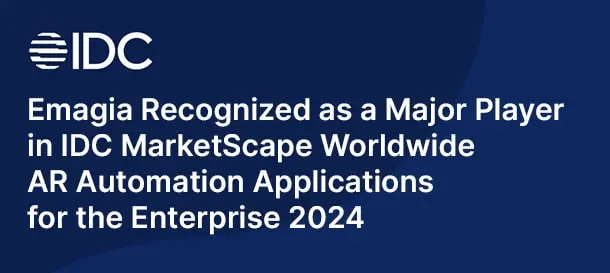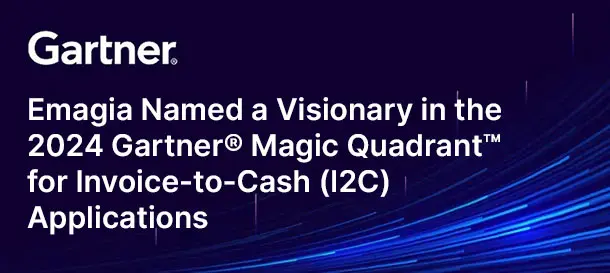What’s Manual Finance Really Costing You?
Are outdated, manual finance processes silently draining your manufacturing company’s profitability?
In an industry where every second and every cent counts, manufacturing companies still stuck with spreadsheets, siloed systems, and manual data entry are bleeding efficiency and working capital. These hidden costs aren’t just operational, they’re strategic. For CFOs and finance leaders, it’s no longer a question of “Should we automate?”, but rather “How fast can we transform?”
In this blog, we’ll explore the hidden financial and operational toll of manual Order-to-Cash (O2C) processes in manufacturing, and how intelligent automation, powered by Emagia, can revolutionize finance, enhance cash flow, and future-proof your operations.
The High Price of Manual Finance in Manufacturing
Slower Cash Flow and Rising DSO
- Research shows manufacturers using manual invoice processes (fewer than 20,000 invoices/year) take significantly longer to collect receivables with DSO typically extending, while firms with automated systems reduce DSO by several days. Although a specific, published average DSO shift in manufacturing wasn’t publicly available, a working‑paper confirms that each day of DSO reduction improves a firm’s cash position significantly.
- In practice, reducing DSO by even 5–10 days frees working capital and directly supports production cycles and reinvestment capacity.
Operational Overhead & Resource Drain
- According to the Institute of Finance & Management, firms manually processing invoices incur a median cost of $15.97 per invoice, versus $12.98 for automated processes, an increase of roughly 23% per invoice.
- With tens of thousands of invoices annually, that overhead difference translates into tens of thousands of dollars in extra costs and labor.
Disconnected Systems = Broken Visibility
While web‑based stats are sparse for decentralized manufactures, industry reporting highlights that only 24% of companies manually processing invoices can consistently pay purchase‑order based invoices without delay. This low performance underscores poor visibility, slow workflows, and disconnected financial data across geographies and systems.

Deductions: The Silent Revenue Killer
- A striking 2% duplicate‑payment rate exists in organizations relying on manual invoice processing, meaning that in volume‑rich environments (say 10,000 invoices/month), you risk 200 duplicate payments monthly, directly eroding margins
- Also, per IOFM, only 5% of AP teams have fully automated invoice/payment workflows—suggesting that the vast majority face deduction, dispute, and short‑payment resolution delays that human‑error‑driven systems simply can’t catch efficiently.
How Emagia Can Help
Accelerated Cash Application with AI
Emagia’s AI-powered Cash Application Software automates invoice-to-payment matching with over 95% straight-through processing. Instead of spending hours reconciling bank statements, your team can focus on higher-value tasks like forecasting and analysis.
With multi-bank, multi-currency, and multi-ERP capabilities, global manufacturing enterprises can achieve real-time cash visibility across regions.
Intelligent Collections with Digital Assistants
Gia, Emagia’s AI-powered digital finance assistant, intelligently prioritizes collections, automates follow-ups, and flags high-risk accounts. The result: faster collections, improved customer experience, and reduced bad debt.
Your collectors can manage more accounts with greater efficiency, ultimately driving down DSO and improving cash velocity.
Smarter Deductions Management
Emagia’s Deductions Management Software captures, categorizes, routes, and resolves deductions using intelligent workflows and AI-powered insights. You gain faster dispute resolution, less revenue leakage, and better collaboration across sales, customer service, and finance teams.
Digital Customer Experience with EIPP Portal
Offer your B2B customers a self-service Electronic Invoice Presentment and Payment (EIPP) Portal to access invoices, make payments, raise disputes, and manage account statements online—24/7. This not only boosts customer satisfaction but also accelerates your collections process.
Actionable Insights with Advanced Analytics
Real-time dashboards and AI-driven reports offer CFOs a comprehensive view of receivables, collections performance, dispute trends, and more enabling smarter, faster, and proactive decision-making.
Automation Isn’t the Future, It’s the Now
Manual finance processes in manufacturing are more than just slow, they’re expensive, error-prone, and unsustainable in a digital-first world.
CFOs and finance leaders have a clear choice: continue operating in silos and spreadsheets, or embrace autonomous finance to eliminate inefficiencies, unlock working capital, and enable smarter growth.
Emagia’s AI-powered Order-to-Cash solutions are engineered to help manufacturing companies eliminate hidden costs and achieve transformative financial performance.
Are you ready to lead your finance function into the future?
👉 Connect with Emagia and see how your manufacturing finance operations can become faster, smarter, and future-ready.
FAQs
What is Cash Application Automation?
Cash Application Automation uses AI and OCR technologies to automatically match incoming payments with corresponding invoices. This reduces manual effort and enables faster, more accurate cash posting.
How do Digital Collections work?
Emagia’s Digital Collections solution leverages AI to prioritize delinquent accounts, automate reminder workflows, and streamline collector actions—resulting in improved recovery rates with less manual work.
What is Deductions Management and why is it important in manufacturing?
Deductions Management automates the capture, categorization, and resolution of customer deductions. For manufacturers, this prevents revenue leakage, accelerates recovery, and reduces write-offs.
What is an EIPP Portal?
An EIPP (Electronic Invoice Presentment and Payment) Portal is a self-service digital platform that allows customers to view invoices, make payments, raise disputes, and download account statements—enhancing convenience and accelerating collections.
What does Straight-Through Processing (STP) mean?
STP refers to the percentage of financial transactions processed without manual intervention. Higher STP results in greater speed, lower costs, and fewer errors across finance operations.
What is DSO (Days Sales Outstanding) and how does automation impact it?
DSO measures how quickly a company collects receivables. Automation reduces DSO by accelerating invoicing, payment matching, and collections, thereby improving cash flow and working capital.
What is a Finance Automation Platform?
A Finance Automation Platform like Emagia integrates AI, machine learning, and analytics to automate the full Order-to-Cash process—improving efficiency, accuracy, and decision-making across finance teams.
Can Emagia integrate with our existing ERP systems?
Yes. Emagia offers seamless integration with major ERP systems including SAP, Oracle, Microsoft Dynamics, and others—ensuring smooth implementation and minimal disruption.




